放牛班的春天英文介绍
- 格式:ppt
- 大小:446.00 KB
- 文档页数:2
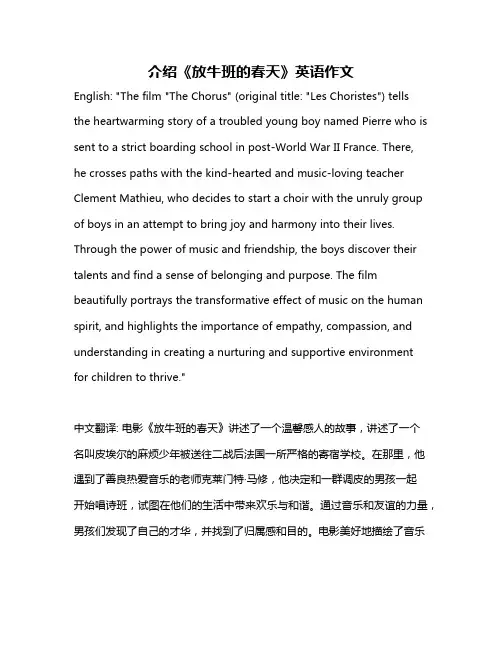
介绍《放牛班的春天》英语作文English: "The film "The Chorus" (original title: "Les Choristes") tellsthe heartwarming story of a troubled young boy named Pierre who is sent to a strict boarding school in post-World War II France. There,he crosses paths with the kind-hearted and music-loving teacher Clement Mathieu, who decides to start a choir with the unruly group of boys in an attempt to bring joy and harmony into their lives. Through the power of music and friendship, the boys discover their talents and find a sense of belonging and purpose. The film beautifully portrays the transformative effect of music on the human spirit, and highlights the importance of empathy, compassion, and understanding in creating a nurturing and supportive environmentfor children to thrive."中文翻译: 电影《放牛班的春天》讲述了一个温馨感人的故事,讲述了一个名叫皮埃尔的麻烦少年被送往二战后法国一所严格的寄宿学校。
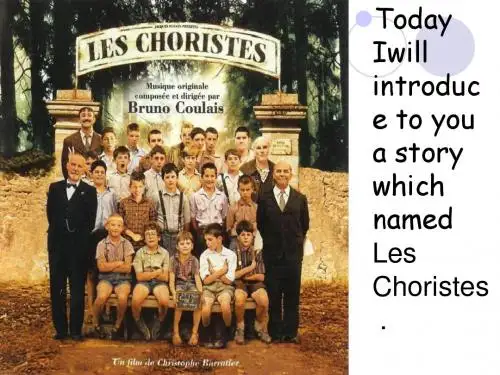
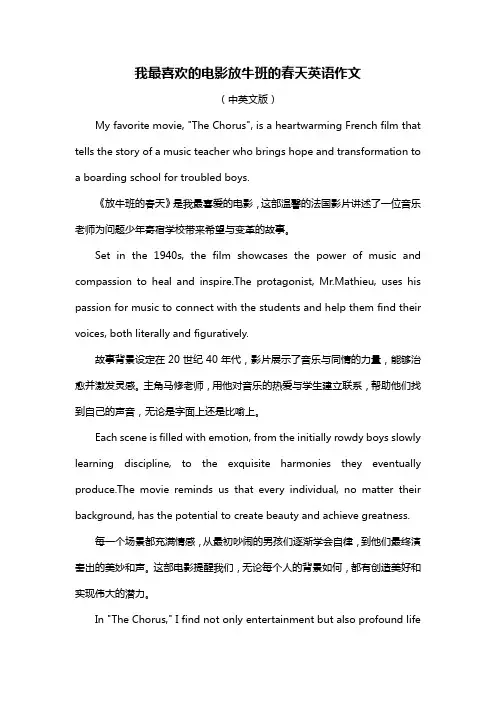
我最喜欢的电影放牛班的春天英语作文(中英文版)My favorite movie, "The Chorus", is a heartwarming French film that tells the story of a music teacher who brings hope and transformation to a boarding school for troubled boys.《放牛班的春天》是我最喜爱的电影,这部温馨的法国影片讲述了一位音乐老师为问题少年寄宿学校带来希望与变革的故事。
Set in the 1940s, the film showcases the power of music and compassion to heal and inspire.The protagonist, Mr.Mathieu, uses his passion for music to connect with the students and help them find their voices, both literally and figuratively.故事背景设定在20世纪40年代,影片展示了音乐与同情的力量,能够治愈并激发灵感。
主角马修老师,用他对音乐的热爱与学生建立联系,帮助他们找到自己的声音,无论是字面上还是比喻上。
Each scene is filled with emotion, from the initially rowdy boys slowly learning discipline, to the exquisite harmonies they eventually produce.The movie reminds us that every individual, no matter their background, has the potential to create beauty and achieve greatness.每一个场景都充满情感,从最初吵闹的男孩们逐渐学会自律,到他们最终演奏出的美妙和声。
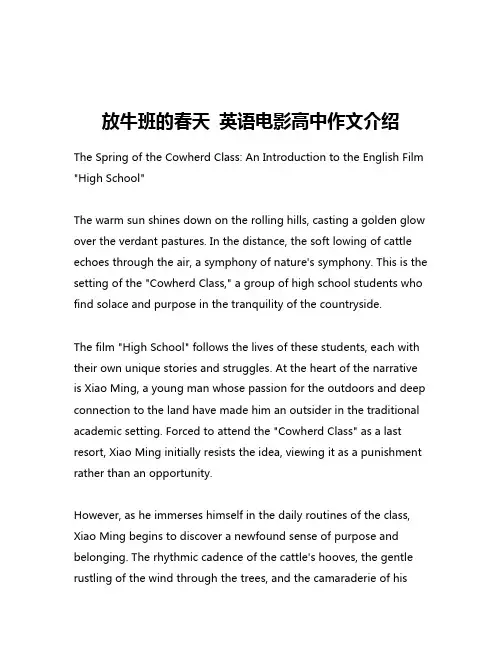
放牛班的春天英语电影高中作文介绍The Spring of the Cowherd Class: An Introduction to the English Film "High School"The warm sun shines down on the rolling hills, casting a golden glow over the verdant pastures. In the distance, the soft lowing of cattle echoes through the air, a symphony of nature's symphony. This is the setting of the "Cowherd Class," a group of high school students who find solace and purpose in the tranquility of the countryside.The film "High School" follows the lives of these students, each with their own unique stories and struggles. At the heart of the narrative is Xiao Ming, a young man whose passion for the outdoors and deep connection to the land have made him an outsider in the traditional academic setting. Forced to attend the "Cowherd Class" as a last resort, Xiao Ming initially resists the idea, viewing it as a punishment rather than an opportunity.However, as he immerses himself in the daily routines of the class, Xiao Ming begins to discover a newfound sense of purpose and belonging. The rhythmic cadence of the cattle's hooves, the gentle rustling of the wind through the trees, and the camaraderie of hisfellow classmates all serve to soothe his restless spirit. It is in this tranquil setting that Xiao Ming begins to shed the burdens of his past and embrace the possibilities of the future.One of the most striking aspects of the film is the way it captures the beauty and serenity of the natural world. The cinematography is breathtaking, with sweeping vistas of rolling hills and lush meadows that seem to stretch on endlessly. The camera lingers on the simple pleasures of the Cowherd Class – the act of milking a cow, the gentle tending of a garden, the shared meals around a crackling fire. These moments of quiet contemplation and connection to the land are juxtaposed with the frenetic pace and overwhelming demands of the traditional academic system, highlighting the importance of finding balance and harmony in one's life.As Xiao Ming's journey unfolds, we witness his transformation from a reluctant outsider to a confident and engaged member of the Cowherd Class. He learns valuable skills, such as animal husbandry and crop cultivation, that not only provide him with practical knowledge but also instill in him a deep appreciation for the natural world. Through his interactions with his classmates, Xiao Ming also begins to confront his own insecurities and fears, finding the courage to open up and share his own story.One of the most poignant moments in the film comes when XiaoMing's parents, initially skeptical of his decision to join the Cowherd Class, come to visit and witness the positive changes in their son. They are struck by the sense of community and purpose that their son has found, and they come to understand the value of the unconventional education he is receiving. This scene serves as a powerful reminder that sometimes the most meaningful learning takes place outside the confines of the traditional classroom.As the film draws to a close, we see Xiao Ming and his classmates facing a crucial decision – whether to continue on the path of the Cowherd Class or to return to the conventional academic system. The choice is not an easy one, as each option offers its own set of challenges and rewards. Ultimately, the decision rests on the individual's ability to listen to their own inner voice and to trust in the wisdom of the natural world.In many ways, "High School" is a testament to the transformative power of education and the importance of finding one's own path in life. It is a film that celebrates the beauty of the natural world, the value of community, and the resilience of the human spirit. Through the lens of the Cowherd Class, the film invites us to reconsider our own preconceptions about education and to embrace the possibility of finding fulfillment and purpose in unexpected places.。
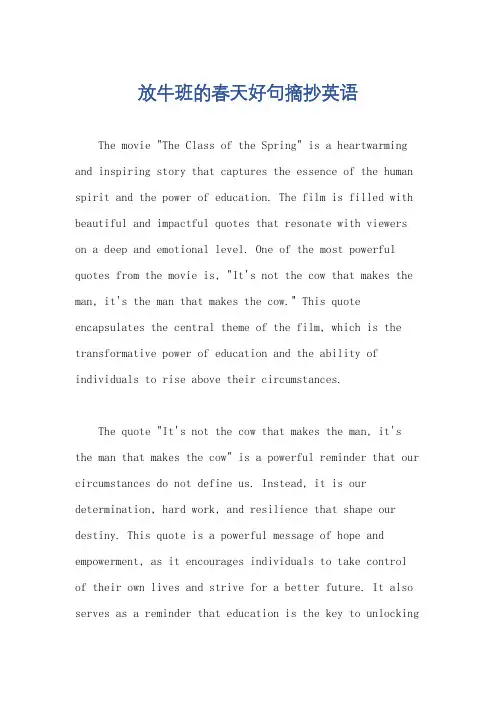
放牛班的春天好句摘抄英语The movie "The Class of the Spring" is a heartwarming and inspiring story that captures the essence of the human spirit and the power of education. The film is filled with beautiful and impactful quotes that resonate with viewers on a deep and emotional level. One of the most powerful quotes from the movie is, "It's not the cow that makes the man, it's the man that makes the cow." This quote encapsulates the central theme of the film, which is the transformative power of education and the ability of individuals to rise above their circumstances.The quote "It's not the cow that makes the man, it's the man that makes the cow" is a powerful reminder that our circumstances do not define us. Instead, it is our determination, hard work, and resilience that shape our destiny. This quote is a powerful message of hope and empowerment, as it encourages individuals to take control of their own lives and strive for a better future. It also serves as a reminder that education is the key to unlockingone's potential and breaking free from the constraints of poverty and adversity.Another impactful quote from the movie is, "The important thing is not to be the best, but to do your best." This quote is a powerful message about the value of effort and determination. It emphasizes the importance of striving for personal excellence and giving one's best in all endeavors. This quote is particularly relevant in the context of the film, as it highlights the importance of education as a means of self-improvement and personal growth. It encourages students to focus on their own progress and development, rather than comparing themselves to others.The quote "The important thing is not to be the best, but to do your best" also carries a universal message that resonates with people from all walks of life. It serves as a reminder that success is not solely defined by external achievements, but by the effort and dedication that individuals put into their pursuits. This quote is a powerful motivator for students, as it encourages them toapproach their studies with a positive attitude and a strong work ethic.The movie "The Class of the Spring" is filled with poignant and thought-provoking quotes that capture the essence of the human experience. One of the most impactful quotes from the film is, "Education is the most powerful weapon which you can use to change the world." This quote, attributed to Nelson Mandela, encapsulates the central theme of the movie, which is the transformative power of education. It serves as a powerful reminder that education is not only a means of personal advancement, but also a force for positive change in the world.The quote "Education is the most powerful weapon which you can use to change the world" carries a profound message about the importance of education in shaping the future of individuals and society as a whole. It emphasizes the role of education in empowering individuals to overcome adversity, pursue their dreams, and make a positive impact on the world. This quote is particularly relevant in the context of the film, as it underscores the value ofeducation in uplifting disadvantaged communities and creating opportunities for a better future.In conclusion, "The Class of the Spring" is a powerful and inspiring film that is filled with beautiful and impactful quotes. The quotes from the movie resonate with viewers on a deep and emotional level, conveying powerful messages about the transformative power of education, the value of effort and determination, and the potential for positive change in the world. These quotes serve as powerful reminders of the human spirit and the capacity for individuals to rise above their circumstances and create a better future through the power of education.。
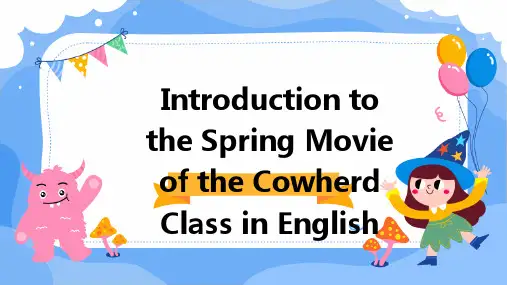
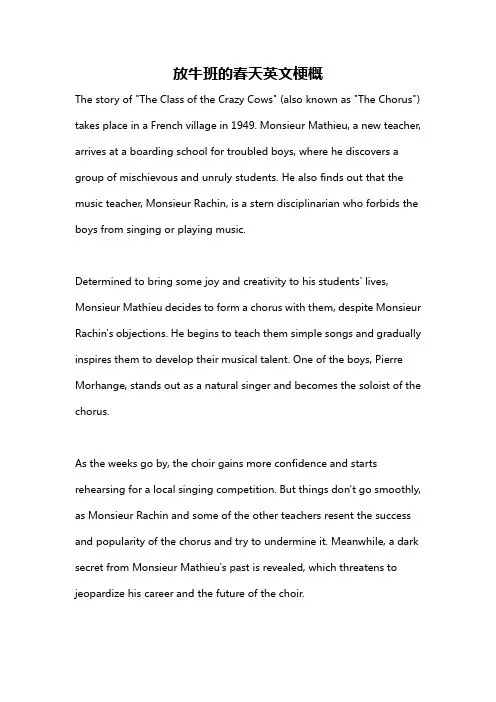
放牛班的春天英文梗概The story of "The Class of the Crazy Cows" (also known as "The Chorus") takes place in a French village in 1949. Monsieur Mathieu, a new teacher, arrives at a boarding school for troubled boys, where he discovers a group of mischievous and unruly students. He also finds out that the music teacher, Monsieur Rachin, is a stern disciplinarian who forbids the boys from singing or playing music.Determined to bring some joy and creativity to his students' lives, Monsieur Mathieu decides to form a chorus with them, despite Monsieur Rachin's objections. He begins to teach them simple songs and gradually inspires them to develop their musical talent. One of the boys, Pierre Morhange, stands out as a natural singer and becomes the soloist of the chorus.As the weeks go by, the choir gains more confidence and starts rehearsing for a local singing competition. But things don't go smoothly, as Monsieur Rachin and some of the other teachers resent the success and popularity of the chorus and try to undermine it. Meanwhile, a dark secret from Monsieur Mathieu's past is revealed, which threatens to jeopardize his career and the future of the choir.In the end, however, the boys' passion and talent triumph over adversity. They perform an emotional and powerful rendition of the hymn "Caresse sur l'Océan" (A Caress on the Ocean) at the competition, earning the admiration and respect of the judges and the audience. Monsieur Mathieu and the boys realize that music is not just a form of entertainment, but a way of expressing their emotions, connecting with each other, and finding meaning in life.。
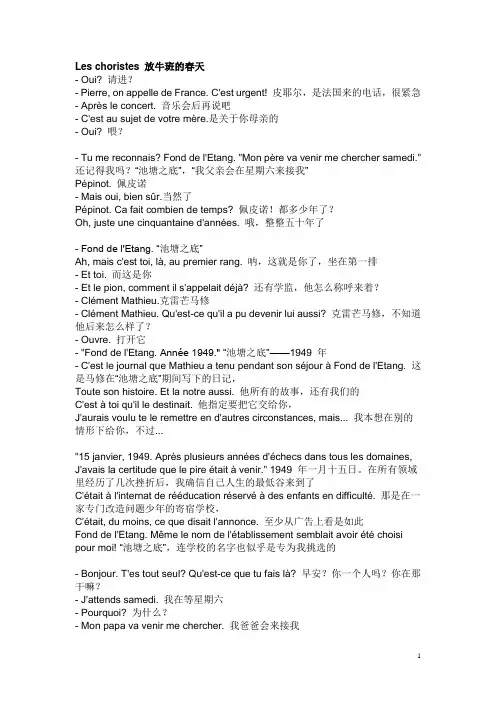
Les choristes 放牛班的春天- Oui? 请进?- Pierre, on appelle de France. C'est urgent! 皮耶尔,是法国来的电话,很紧急- Après le concert. 音乐会后再说吧- C'est au sujet de votre mère.是关于你母亲的- Oui? 喂?- Tu me reconnais? Fond de l'Etang. "Mon père va venir me chercher samedi."还记得我吗?“池塘之底”,“我父亲会在星期六来接我”Pépinot. 佩皮诺- Mais oui, bien sûr.当然了Pépinot. Ca fait combien de temps? 佩皮诺!都多少年了?Oh, juste une cinquantaine d'années. 哦,整整五十年了- Fond de l'Etang. “池塘之底”Ah, mais c'est toi, là, au premier rang. 呐,这就是你了,坐在第一排- Et toi. 而这是你- Et le pion, comment il s'appelait déjà? 还有学监,他怎么称呼来着?- Clément Mathieu.克雷芒马修- Clément Mathieu. Qu'est-ce qu'il a pu devenir lui aussi? 克雷芒马修,不知道他后来怎么样了?- Ouvre. 打开它- "Fond de l'Etang. Année 1949." “池塘之底”——1949 年- C'est le journal que Mathieu a tenu pendant son séjour à Fond de l'Etang. 这是马修在“池塘之底”期间写下的日记,Toute son histoire. Et la notre aussi. 他所有的故事,还有我们的C'est à toi qu'il le destinait. 他指定要把它交给你,J'aurais voulu te le remettre en d'autres circonstances, mais... 我本想在别的情形下给你,不过..."15 janvier, 1949. Après plusieurs années d'échecs dans tous les domaines, J'avais la certitude que le pire était à venir." 1949 年一月十五日。
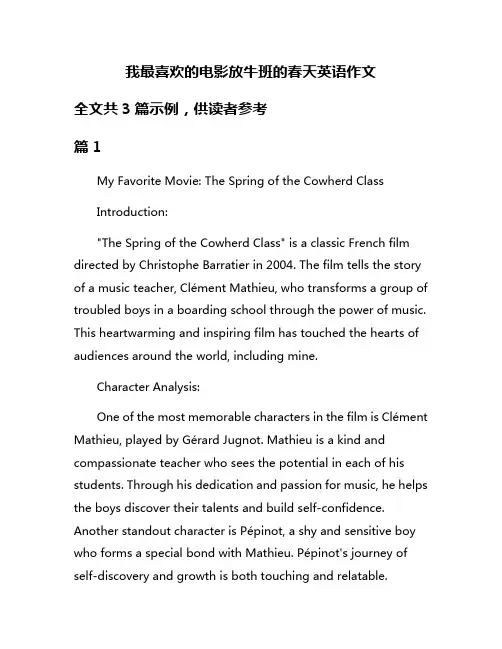
我最喜欢的电影放牛班的春天英语作文全文共3篇示例,供读者参考篇1My Favorite Movie: The Spring of the Cowherd ClassIntroduction:"The Spring of the Cowherd Class" is a classic French film directed by Christophe Barratier in 2004. The film tells the story of a music teacher, Clément Mathieu, who transforms a group of troubled boys in a boarding school through the power of music. This heartwarming and inspiring film has touched the hearts of audiences around the world, including mine.Character Analysis:One of the most memorable characters in the film is Clément Mathieu, played by Gérard Jugnot. Mathieu is a kind and compassionate teacher who sees the potential in each of his students. Through his dedication and passion for music, he helps the boys discover their talents and build self-confidence. Another standout character is Pépinot, a shy and sensitive boy who forms a sp ecial bond with Mathieu. Pépinot's journey of self-discovery and growth is both touching and relatable.Themes:One of the central themes of the film is the transformative power of music. Through singing in the school choir, the boys learn to work together, express themselves creatively, and overcome their personal struggles. The film also explores the importance of compassion, understanding, and patience in education. Mathieu's approach to teaching highlights the impact that a caring and dedicated teacher can have on the lives of students.Personal Connection:As someone who is passionate about music and education, "The Spring of the Cowherd Class" resonates with me on a deep level. The film reminds me of the joy and fulfillment that comes from sharing music with others and helping them discover their own talents. It also reinforces my belief in the power of education to inspire and transform lives.Conclusion:"The Spring of the Cowherd Class" is a timeless and uplifting film that celebrates the beauty of music, the importance of mentorship, and the resilience of the human spirit. Its message of hope, redemption, and the power of kindness continues toinspire me and remind me of the profound impact that teachers and artists can have on the world. This film will always hold a special place in my heart as my favorite movie of all time.篇2Title: My Favorite Movie: "The Springtime in a Small Town""The Springtime in a Small Town" is my all-time favorite movie. Based on the novel of the same name by chi Zijian, this Chinese film tells the story of a young woman named Yuwen who is trapped in a loveless marriage in post-World War II China. When an old friend, Zhang, comes to visit, old feelings are reignited, causing Yuwen to question her loyalty to her husband and her duty to her family.What I love most about this movie is its haunting atmosphere and beautiful cinematography. The director, Tian Zhuangzhuang, skillfully captures the quiet desperation of the characters, using long shots of the dilapidated town and its surrounding countryside to convey a sense of loss and longing. The performances of the actors are equally impressive, especially those of the lead actress, Xu Jinglei, who brings a quiet intensity to her role as Yuwen.But what really sets "The Springtime in a Small Town" apart for me is its exploration of complex emotional themes. The love triangle between Yuwen, Zhang, and her husband, Liyan, is a study in conflicting desires and responsibilities. Yuwen is torn between her desire for freedom and her sense of duty to her family, while Zhang struggles with his own feelings of guilt and loyalty. Liyan, meanwhile, is caught in the middle, unsure of how to respond to the growing tension between his wife and his friend.In the end, "The Springtime in a Small Town" is a poignant and powerful meditation on love, duty, and the passage of time. It reminds us that the choices we make can have far-reaching consequences, and that sometimes the greatest act of courage is simply to let go.In conclusion, "The Springtime in a Small Town" is a masterpiece of Chinese cinema that deserves to be seen by a wider audience. Its timeless themes and beautiful visuals make it a film that will stay with you long after the credits roll. I highly recommend it to anyone who appreciates thoughtful, emotionally resonant cinema.篇3My Favorite Movie: The Classic French Film "Les Choristes"One of my all-time favorite movies is the classic French film "Les Choristes" (The Chorus), directed by Christophe Barratier. This heartwarming and inspiring movie tells the story of a music teacher, Clément Mathieu, who is hired as a supervisor in a strict boarding school for troubled boys in post-World War II France. Through his passion for music and his belief in the power of singing, Mathieu transforms the lives of the boys in the school and brings hope and joy to their harsh and regimented world.The film is set in the 1940s in the fictional Fond de l'Étang boarding school, run by the draconian headmaster, Monsieur Rachin. The boys in the school are unruly and rebellious, and the atmosphere is bleak and oppressive. Mathieu, played by the talented actor Gérard Jugnot, brings a new light into their lives when he introduces them to the world of music and starts a choir called "Les Choristes."As the boys begin to sing together, they find a sense of unity and purpose that transcends their difficult circumstances. Mathieu discovers the hidden talents of the boys, including one exceptional singer named Pierre Morhange, whose angelic voice captures the hearts of all who hear him. Through their shared love of music, the boys learn the values of teamwork, friendship,and self-expression, and they find a sense of belonging and pride in their abilities.The film is filled with beautiful music, including classic French songs such as "Vois sur ton chemin" and "Caresse surl'ocean," sung by the boys in the choir. The performances are moving and uplifting, and they showcase the power of music to touch the soul and bring people together. The cinematography is also stunning, with sweeping shots of the French countryside and intimate close-ups that capture the emotions of the characters.One of the most memorable scenes in the film is when the boys perform in a concert for the townspeople, who are moved by their talent and passion. The joy and pride on the faces of the boys as they sing with all their hearts is truly inspiring, and it is a testament to the transformative power of music in their lives."Les Choristes" is a timeless and heartwarming movie that celebrates the beauty of music and the resilience of the human spirit. It reminds us that even in the darkest times, there is always hope and beauty to be found, and that through the power of art and creativity, we can transcend our difficulties and find joy and connection with others.In conclusion, "Les Choristes" is a masterpiece of filmmaking that continues to touch hearts and inspire audiences around the world. Its message of hope, love, and the transformative power of music resonates with viewers of all ages, and it is a film that will always hold a special place in my heart. I highly recommend it to anyone who appreciates the beauty of music and the magic of cinema.。
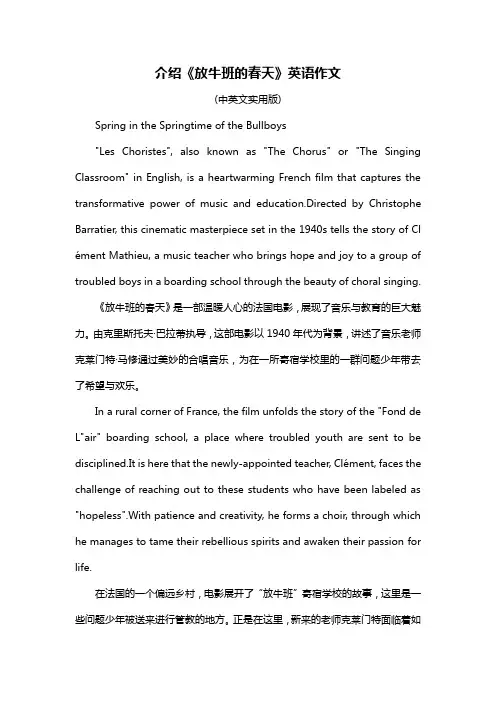
介绍《放牛班的春天》英语作文(中英文实用版)Spring in the Springtime of the Bullboys"Les Choristes", also known as "The Chorus" or "The Singing Classroom" in English, is a heartwarming French film that captures the transformative power of music and education.Directed by Christophe Barratier, this cinematic masterpiece set in the 1940s tells the story of Cl ément Mathieu, a music teacher who brings hope and joy to a group of troubled boys in a boarding school through the beauty of choral singing.《放牛班的春天》是一部温暖人心的法国电影,展现了音乐与教育的巨大魅力。
由克里斯托夫·巴拉蒂执导,这部电影以1940年代为背景,讲述了音乐老师克莱门特·马修通过美妙的合唱音乐,为在一所寄宿学校里的一群问题少年带去了希望与欢乐。
In a rural corner of France, the film unfolds the story of the "Fond de L"air" boarding school, a place where troubled youth are sent to be disciplined.It is here that the newly-appointed teacher, Clément, faces the challenge of reaching out to these students who have been labeled as "hopeless".With patience and creativity, he forms a choir, through which he manages to tame their rebellious spirits and awaken their passion for life.在法国的一个偏远乡村,电影展开了“放牛班”寄宿学校的故事,这里是一些问题少年被送来进行管教的地方。
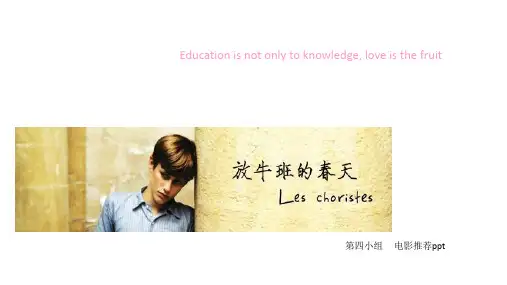
介绍《放牛班的春天》英语作文I believe that, at the very beginning, everyone was sure that one day his dream would cometrue by perseverance. However, with growing up, things are going to be more difficult andcomplex. Sometimes, when you are coming to the fork of a road, the light at the end of atunnel lost. Then, people no longer have accesses to achieve what they wanted before. lt istrue for both the real life and the life in the movie Les Choristes. While, difficulties never stopbrave guys seeking the true, the good and the beauty. To me, l always believe the beauty ofglorious ideals and elevated minds. Clement Mathieu was a musician with super talent, while it lacks scope for his ability since hewas in French rural areas. One day, Mathieu who failed to achieve his ambition, came to aschool regarded as "the bottom of a pool" and found that boys living there have kinds ofproblems. To make matter worse, the headmaster was very indifferent. He was used to abusehis right to use corporal punishment frequently. Monsieur Mathieu began to try to changethe situation. But, all of his ways turn out useless. Finally, he turned to the music. He hasfound that those boys are interested in singing something, good or bad,or funny or relaxingThey just love singing. So he began to train them with professional method. l have to say thatit reallyis an amazing choir-Boys sing beautiful and bright songs written by Monsieur Mathieu; theyalso managed to perform those songs perfectly. Boys’ hearts seemed to be melted andpurified by the power of music as well as Monsieur Mathieu's patience. Change was in theair of this "bottom of a pool" , and it was just a question of when. Everything seemed sohopeful again. In the end, unfortunately, Monsieur Mathieu was fired by the meanheadmaster in the name of an accident. On his way of leaving, there were lots of paper planesfree falling from the window of classroom. They were from those boys. Even though therewere no names on paper planes, our dear teacher knew exactly who did that. At the sametime, boys locked the angry headmaster out of the door and sang their song to say goodbyeto their teacher.Therefore, l think it is the true essence of education as well as the true meaning of life. Can wesay that?As for me, there is still someone like Monsieur Mathieu l really appreciate. They are teachersin my high school. Of course, they needn' t rescue me from troubles as bad as those in themovie. But they actually taught me many crucial things how to think, how to adhere to myprinciples and what kind of values l should keep. Conspicuously, spiritual guidesfor a teenager who were almost lost are definitely great. Then, l guess this kind of goodeducation is life-giving spring breeze and rain. Besides, the beautiful heart stands forbriliance of humanity. No matter how dark the situation is, the great heart will alwaysdecorate the world and make lives different. 幽晦的“池塘之底”。
介绍《放牛班的春天》英语作文Title: The Harmonious Echoes of "Les Choristes" (放牛班的春天)In the realm of cinematic masterpieces that celebrate the transformative power of music and education, "Les Choristes" (The Chorus), released in 2004 and directed by Christophe Barratier, stands as a poignant testament to the resilience of the human spirit. Set against the backdrop of a rural French boarding school for troubled boys in the 1940s, this heartwarming drama unfolds with the arrival of Clément Mathieu, a humble and compassionate music teacher, played brilliantly by Gérard Jugnot.Mathieu's unconventional teaching methods, centered around choir singing, gradually breathe life into the desolate institution, known colloquially as 'the school of lost causes.' Through his patience and belief in eachchild's potential, he manages to reach even the most hardened hearts, particularly that of Pierre Morhange, a talented but rebellious boy portrayed by Jean-Baptiste Maunier. The film's narrative arc is enriched by the subtle revelation of Mathieu's own unfulfilled dreams of being acomposer, which find new hope in nurturing the youngtalents under his tutelage.The score, composed by Bruno Coulais, is nothing shortof enchanting. It weaves a melodic tapestry that not only complements the visual storytelling but also becomes a character in its own right, echoing the emotional journeys of the protagonists. Standout tracks like "Vois sur ton chemin" ("Look to Your Path") encapsulate the film'scentral themes of redemption, hope, and the impact of positive influence."Les Choristes" is a triumph of storytelling that transcends linguistic barriers, resonating with audiences worldwide through its universal themes and the emotive power of music. It serves as a reminder that even in the darkest corners, where hope seems lost, a spark ofcreativity and compassion can illuminate the path towards a brighter future.---《放牛班的春天》作为一部深刻展现音乐与教育变革力量的电影杰作,于2004年由克里斯托夫·巴拉蒂耶执导,成为颂扬人类精神韧性的动人证明。
放牛班的春天英文简介"Spring in the Cowshed" is a Chinese film directed by Tian Zhuanzhi and released in 1991. The film depicts the heartwarming story of a group of primary school students and their music teacher who form a small orchestra, known as the "Cowshed Symphony Orchestra", during the Cultural Revolution in China.Set in a rural village, the film follows the students' journey from being inexperienced and unskilled to becoming talented musicians under the guidance of their dedicated teacher. Despite the challenging circumstances they face during the tumultuous period, such as the lack of musical instruments and the pressure to conform to political ideologies, the children's passion and determination to pursue their dreams shine through."Spring in the Cowshed" portrays a beautiful friendship and camaraderie among the young musicians as they work together, overcome obstacles, and strive for excellence. The film captures the resilience and resilience of the human spirit, showcasing the transformative power of music and the strength of unity.With its touching storyline, memorable characters, and heartfeltmessages, "Spring in the Cowshed" has become a beloved classic in Chinese cinema. It highlights the importance of arts education, individual expression, and the pursuit of dreams even in the midst of adversity.。